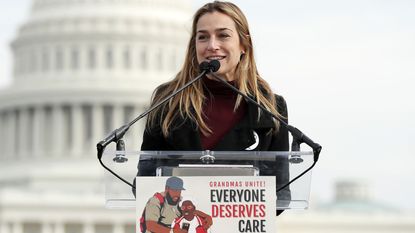

The U.S. is the only wealthy nation that does not guarantee its citizens paid leave. This cold fact inspired organizations and founding director Dawn Huckelbridge—who previously worked at organizations like Supermajority, Planned Parenthood and People for the American Way—to launch Paid Leave for All Action in 2019. The action arm of Paid Leave for All unites organizations fighting for the 75 percent of Americans who do not have access to paid leave through an employer. Here, Huckelbridge outlines what we need to know about the state of paid leave and President Biden's plan to fund it.
Last week, President Biden unveiled his $6.8 trillion budget plan for the coming 2024 fiscal year, and in it, the strongest budget proposal for a federal paid family and medical leave program in history.
To hearken back to one of Biden’s sayings, this is a "BFD."
The White House is calling it a “blueprint to invest in America, lower costs for families, protect and strengthen Medicare and Social Security, and reduce the deficit by making the wealthy and corporations pay their fair share.” It follows on the agenda that the President detailed in his State of the Union in February, where he also affirmed his commitment to paid leave. The proposal includes a $325 billion commitment to a comprehensive, permanent paid family and medical leave program. The program would provide up to 12 weeks of paid leave to cover you or a loved one’s serious health need and bonding with a new child, as well as leave for military deployment, safe leave from sexual or domestic violence, and leave for bereavement.
This isn’t the first time the President has advocated for paid leave. It was in his previous budgets and a central part of his economic agenda, included in his original “Build Back Better” plan, the President’s core legislative framework in the first year of his administration. That legislation was later split off into separate bills and the family care components were lost in negotiations. There was overwhelming support for paid leave and an outcry when it was cut. We did in fact pass paid family and medical leave in the U.S. House of Representatives in 2021, and it was only one vote short had it moved to the Senate at that time. And now, as another election cycle begins, advocates and voters are confirming that paid leave is at the top of the agenda of must-pass legislation.
What’s so important about all this?
Today the United States remains one of only six countries in the world that guarantees no form of paid leave for its workers. This means that:
- 3 in 4 working people do not have paid family leave through their jobs.
- 1 in 4 women have returned to work within two weeks of giving birth, while their bodies are not yet healed and their newborns are perhaps not even able to lift their heads yet.
- 61 percent of people caring for an aging loved one, or a loved one with a disability or medical condition, are doing this while working and without support.
Under these conditions, the gender and racial inequities persist, and grow. On a personal level, in one of the wealthiest countries in the world, we are missing our parents’ last breaths, our babies’ first smiles, our own treatments and recovery.
Stay In The Know
Marie Claire email subscribers get intel on fashion and beauty trends, hot-off-the-press celebrity news, and more. Sign up here.
And it means that our public health suffers, our economy loses, and all of our families take the hit.
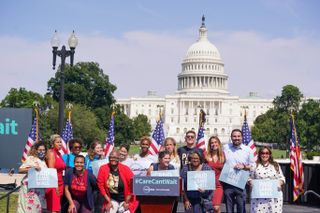
The budget, like all presidential budgets, is not expected to get through Congress intact. It’s on Congress and its budget committees to develop a budget resolution. GOP lawmakers will likely reject the President’s blueprint for federal spending, as they have in the past. There has already been pushback on what some Congressional Republicans have called “woke” or “reckless spending.” Regardless of your political affiliation, there is near unanimous consent among voters that paid family and medical leave is not reckless, but necessary and urgent. In fact, working families lose over $22 billion every year because of our country’s failure to secure it. And passing paid leave with other care policies would actually yield millions of jobs, billions in wages, and trillions in GDP. It’s a boost to bottom lines and a boon to business, especially small business—and two-thirds of small business owners agree and want a national paid leave program to retain their workers and help them compete.
Regardless of the final budget resolution, the President’s budget proposal remains an important document that reflects the administration’s policy priorities, values—and likely their campaign plan.
Paid Leave for All Action did polling in midterm battleground states that found 81 percent of voters support paid leave—which was also a double-digit increase in the last year. Paid leave is popular with a majority of voters in all political parties, and especially popular with independent women voters. Paid leave is a hugely impactful policy, a proven tool for our health, our financial security, and our families’ wellbeing. And it’s key to electoral outcomes.
Why this can, and must, all change.
The federal budget and the President’s proposal are just parts of how government programs are funded and work. We need legislation to move again for paid leave’s passage, and we need the votes in both chambers of Congress. But paid leave was right at the finish line and we believe this momentum and mandate will only grow. In just the first months of this year, we’ve already seen unprecedented energy and action. A historic bipartisan working group launched for the first time in the House of Representatives, as well as a Congressional Dads Caucus focused on passing paid leave. Paid leave legislation will be reintroduced again soon. The President and Vice President have taken executive actions and committed to a renewed push. We represent tens of millions of people and voters across the country, and every day more organizers, advocates, small business owners, and working families join us across the country. The movement is stronger than ever. And as a movement, alongside the President and the growing number of champions in Congress, we plan to finish the job.

Dawn Huckelbridge is the director of Paid Leave for All and Paid Leave for All Action, a mom, and a passionate supporter of paid leave.
-
 Gwyneth Paltrow Loves This Reality Show and She's Never Been More Relatable
Gwyneth Paltrow Loves This Reality Show and She's Never Been More RelatableShe's a fan of having a "slovenly day," too.
By Meghan De Maria Published
-
 Jennifer Lopez Goes From Pilates Princess to Rich Mom in One Day
Jennifer Lopez Goes From Pilates Princess to Rich Mom in One DayShe's still all-in on the loud luxury lifestyle.
By India Roby Published
-
 Taylor Swift and Travis Kelce Just Returned to the U.S. from This Caribbean Getaway
Taylor Swift and Travis Kelce Just Returned to the U.S. from This Caribbean GetawayThey're still in the honeymoon phase.
By Meghan De Maria Published
-
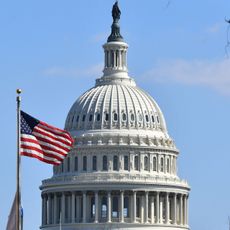 The 2022 Midterm Elections: What to Know Ahead of Election Day
The 2022 Midterm Elections: What to Know Ahead of Election DayConsider this your guide to key races, important dates, and more.
By Rachel Epstein Published
-
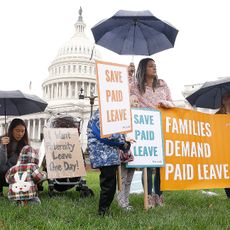 What You Need to Know About Paid Leave Before the Midterms
What You Need to Know About Paid Leave Before the MidtermsEarlier this year, a rare opportunity to finally fill the holes in our care infrastructure wasn't taken. But the leader of the new Paid Leave PAC is here to tell you it’s not over.
By Tanya Benedicto Klich Last updated
-
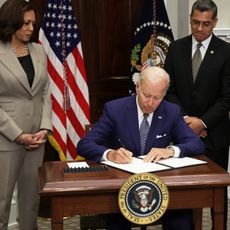 Breaking Down President Biden’s New Executive Order on Abortion Rights
Breaking Down President Biden’s New Executive Order on Abortion Rights“We feel really strongly, particularly given the tremendous amount of legal chaos that has ensued since this decision, that it’s incumbent on us to be careful.”
By Lorena O'Neil Last updated
-
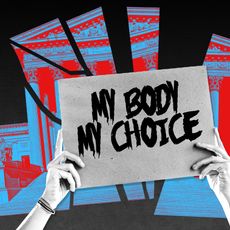 14 Abortion Rights Organizations Accepting Donations to Support Their Fight
14 Abortion Rights Organizations Accepting Donations to Support Their Fight'Roe' is no longer the law of the land, but these organizations won't stop fighting.
By Gabrielle Ulubay Published
-
 Lawmakers, Activists, and Allies Are Reacting With Fury to 'Roe' Being Overturned
Lawmakers, Activists, and Allies Are Reacting With Fury to 'Roe' Being OverturnedThousands are taking to Twitter to express their grief and anger.
By Tanya Benedicto Klich Published
-
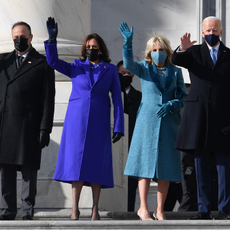 One Year In, What Has the Biden Administration Done for Women?
One Year In, What Has the Biden Administration Done for Women?Secretary of Commerce Gina Raimondo says there's no time for frustration that some legislation has been stymied.
By Maria Ricapito Published
-
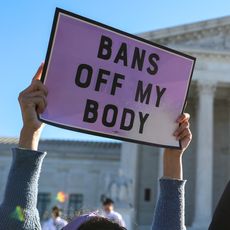 The Supreme Court Is Hearing Arguments in a Case That Could Overturn 'Roe v. Wade'
The Supreme Court Is Hearing Arguments in a Case That Could Overturn 'Roe v. Wade''Dobbs v. Jackson Women's Health Organization' is the most consequential abortion rights case in decades.
By Rachel Epstein Published
-
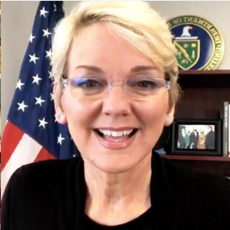 In Conversation: Secretary Jennifer Granholm and Emily Tisch Sussman
In Conversation: Secretary Jennifer Granholm and Emily Tisch Sussman“It’s ridiculous that we’re the only advanced nation on the planet that doesn’t help families with childcare.”
By Emily Tisch Sussman Published